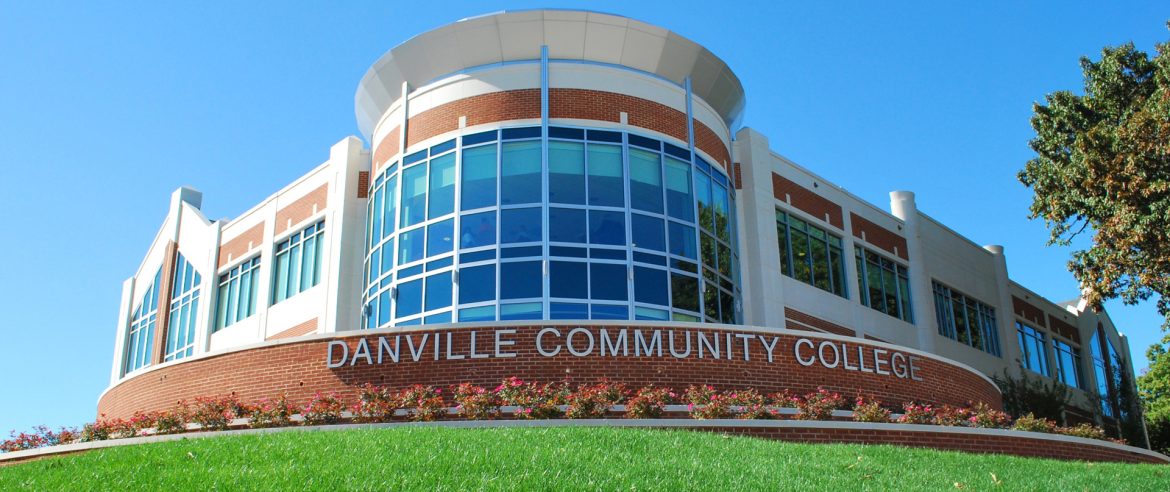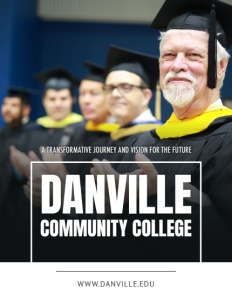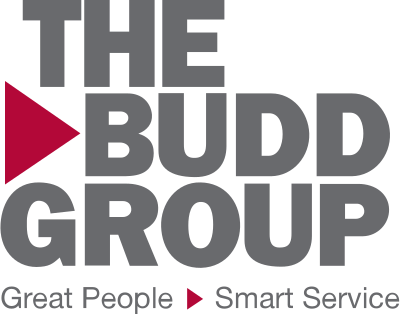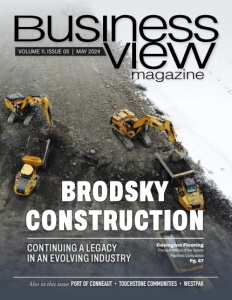Danville Community College
A Transformative Journey and Vision for the Future
Meeting Market Demands by offering a first class and forward-thinking education
Located in the vibrant community of Danville, Danville Community College (DCC) offers diverse and abundant opportunities for learners. Established in 1966, DCC has been instrumental in shaping the academic landscape of southern Virginia, a journey that wouldn’t have been possible without the active participation and support of the community.
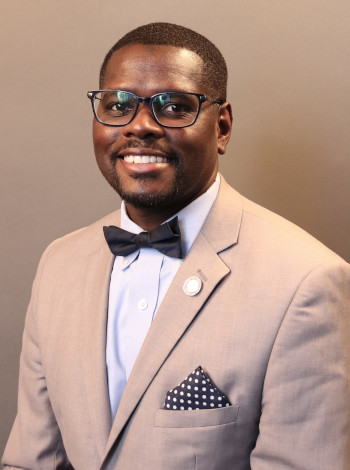
Dr. Jerry Wallace, President
At the helm of DCC’s transformation is Dr. Jerry Wallace, President, whose visionary leadership, fueled by a deep personal commitment to education, has been instrumental in shaping the institution’s path. Alongside him are Dr. Cornelius Johnson, Vice President of Academic Affairs and Student Services; Shannon Hair, Vice President of Advancement and Executive Director of DCCEF; and Faith O’Neil, who spearheads PR and marketing efforts. All of them, driven by a shared passion for education, have played a significant role in DCC’s journey.
Evolution and expansion
Since its establishment in 1966, DCC has quickly adapted to the community’s evolving needs. The merger of Danville Technical Institute and the VPI extension marked a significant milestone, culminating in the establishment of Danville Community College. Initially recognized for its vocational expertise, DCC has expanded its offerings to meet the dynamic demands of the workforce, demonstrating remarkable flexibility over the years.
As DCC’s academic offerings have evolved, so has its impact on the community. The institution has transitioned from a vocational school to a comprehensive institution, offering acclaimed nursing programs and cutting-edge cybersecurity certifications. These diverse academic pathways are tailored to meet the community’s evolving demands and contribute significantly to the region’s educational and economic growth.
O’Neil further highlights DCC’s agility in meeting community needs, citing the swift implementation of programs like the Commercial Driver’s License (CDL) program. The responsiveness is evident in initiatives such as the Early College Program, offering high school juniors and seniors a head start in higher education.
Navigating challenges, DCC’s journey forward
One pressing concern, Dr. Wallace articulates, is the perpetual struggle for adequate funding. Like many community colleges in Virginia, DCC contends with limited resources, receiving only approximately 57 cents for every dollar compared to four-year institutions. The financial constraint hampers efforts to modernize facilities, particularly for programs like building trades, which are imperative for meeting community demands effectively.
Recruiting and retaining skilled faculty and staff present another significant challenge. DCC stresses the necessity of a talented workforce in maintaining its position as a leading educational institution in the region. Despite these obstacles, DCC remains committed to innovation and strategic partnerships, effectively leveraging resources to foster a thriving academic environment.
With enrollment fluctuations typical of community colleges, DCC has proactively managed enrollment through initiatives like the Early College Program in response to demographic shifts impacting Danville’s population trends. The efforts have expanded access to higher education and bolstered enrollment figures, indicating a positive trajectory for the institution.
Empowering education with technology
Technology is essential at Danville Community College (DCC), permeating academic and administrative realms. Implementing high-flex classrooms, fostering dynamic learning experiences and streamlined communication. Recent guest speaker engagements are tangible evidence of the efficacy of innovative spaces in facilitating seamless interaction and knowledge exchange.
Amidst the discussion of technology’s impact, the importance of high-flex classrooms is underlined for its adaptability to the evolving educational landscape. Dr. Johnson elaborates on the significance, particularly in disruptions brought about by the COVID-19 pandemic. By embracing such technological infrastructure, DCC ensures its competitive edge in offering diverse instructional modalities, from traditional face-to-face sessions to fully online courses and the versatile high-flex delivery format.
Beyond traditional classroom boundaries, DCC’s commitment to technological innovation also addresses campus safety and crisis management. O’Neil points to initiatives like the campus-wide alert system featuring beacons and audio cues, demonstrating the institution’s proactive stance on community safety. Additionally, integrating a chatbot on the college website is a valuable resource for students seeking support outside regular office hours, enhancing accessibility and sustaining support services.
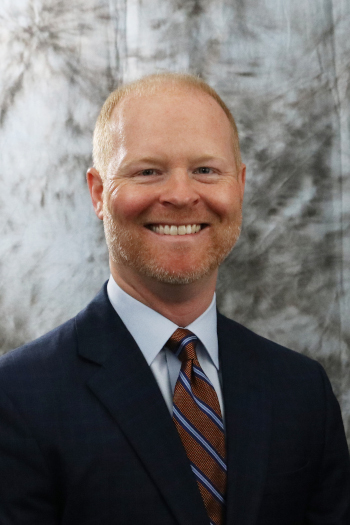
Shannon Hair, Vice President of Advancement and Executive Director of DCCEF
AI integration transforming education
Hair speaks to the dual role of technology at DCC, both internally and externally. Internally, technology plays a vital role in supporting academic programs, with the foundation’s support enabling the acquisition of progressive equipment for various technical programs. Externally, initiatives such as providing laptops to students ensure equitable access to educational resources, particularly in rural communities where internet access may be limited.
Dr. Johnson further addresses the evolving landscape of technology integration in academia, highlighting the institution’s efforts to support faculty in navigating the use of artificial intelligence (AI) in coursework. Through the development of syllabi templates, faculty are empowered to incorporate AI that aligns with industry standards, preparing students for the technological advancements they will encounter in their careers.
Partnerships and feeder schools
Dr. Wallace’s focus on the importance of partnerships embodies a philosophy deeply rooted in community engagement and responsiveness. DCC gains valuable insights into educational needs by forging strong ties with localities and school districts, adopting a seamless transition for students from secondary to post-secondary education. Dr. Wallace states, “The initial partnership is with the localities and the school districts. Those are most important because those school districts are feeder schools, and they can tell us where the programs are.”
Insights into the dynamic interplay between academia and industry shed light on the role of advisory boards as conduits for real-world expertise and feedback. Through regular interaction with industry professionals, DCC faculty stay ahead of emerging trends, technological advancements, and evolving skill requirements, ensuring that graduates have the competencies to thrive in today’s job market. The institution’s commitment to career services further underscores its dedication to holistic student development, providing invaluable resources and support to facilitate successful transitions into the workforce.
Hair underscores the symbiotic relationship between public and private stakeholders in furthering DCC’s mission. Philanthropic contributions, exemplified by the $3 million private bequest, offer financial support and spark innovative initiatives like the Best Award scholarship program. These investments affirm the community’s confidence in DCC’s mission and capacity to effect positive change.
Establishing a Workforce Viewpoint represents a paradigm shift in how DCC engages with industry partners, as evidenced by the proactive outreach to 150 industries. By proactively soliciting feedback and fostering dialogue with key stakeholders, the institution demonstrates its commitment to agility and responsiveness in meeting the evolving needs of the workforce. The initiative, inviting industries to an event to assess their thoughts and engage in conversations, not only strengthens existing partnerships but also paves the way for future collaborations to enhance educational outcomes and drive economic growth.
The approach has already yielded tangible results, such as the partnership with Hitachi Energy in Halifax County, which has led to the development of multiple programs under the direction of Dr. Wallace and Dr. Johnson. Additionally, Hitachi Energy’s support extends beyond program development, as they provide resources for scholarships and sponsorships, exemplifying the mutually beneficial nature of industry partnerships.
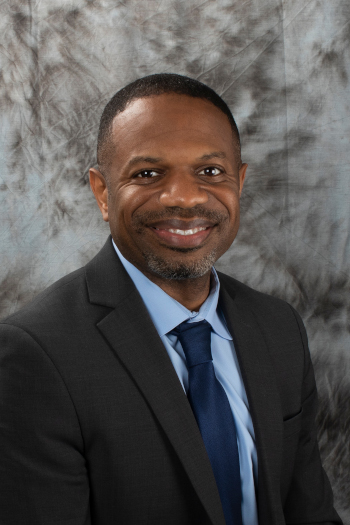
Dr. Cornelius Johnson, Vice President of Academic Affairs and Student Services
Building student engagement
At Danville Community College (DCC), student achievements are measured and celebrated beyond traditional academic standards, emphasizing their broader impact. Dr. Wallace’s focus on personal connections is evident in initiatives like the “Ace the Mighty” book tour, where he and O’Neil engage with elementary students, reflecting DCC’s commitment to inspiring the next generation.
Dr. Johnson highlights the importance of frameworks like the Voluntary Framework of Accountability (VFA) in understanding student success comprehensively, ensuring DCC’s programs meet diverse needs, and preparing students for further education and the workforce. O’Neil stresses the importance of fostering an inclusive campus atmosphere through events like poetry and visual arts competitions, enhancing community pride, and providing platforms for student expression beyond academics.
“We want to ensure that not only do we set students up to transfer to a four-year institution if they desire to continue their education and achieve their bachelor’s degree, but we also want to ensure that they’re ready to enter the workforce.”
O’Neil emphasizes the significance of cultivating a vibrant and inclusive campus atmosphere through celebration. Events like the poetry and visual arts competitions and the annual cybersecurity competition provide students with platforms to showcase their talents and contributions that surpass the academic realm. DCC fosters a sense of community and pride among its diverse student body by offering opportunities for students to display their creativity and abilities.
DCC is shining bright and ready for the future
The future of Danville Community College (DCC) shines brightly, with a vision focused on continued growth, relevance, and community impact. As the college prepares to develop its strategic plan for 2025-2030, it remains committed to fostering partnerships with K-12 schools, universities, and local industries.
“We plan to keep telling our story. DCC is definitely on the rise because of our economic transformation. We’re positioned to partner well with our K-12s and speed to our universities and college partners.”
Dr. Johnson underlines DCC’s role as a college for the community, emphasizing the importance of expanding access to higher education and ensuring program relevance in a rapidly evolving market. By staying on the cutting edge and maintaining leadership in the community, DCC aims to be the most relevant institution for the future of Danville.
“We are in the right place at the right time… it’s just a matter of how high we will go.”
AT A GLANCE
Danville Community College
What: The evolution and future vision of Danville Community College (DCC), highlighting its transformation, challenges, technological integration, partnerships, and focus on student engagement.
Where: Nestled in Southern Virginia, within the dynamic community of Danville, Virginia.
Website: https://danville.edu/
